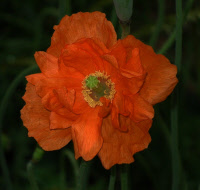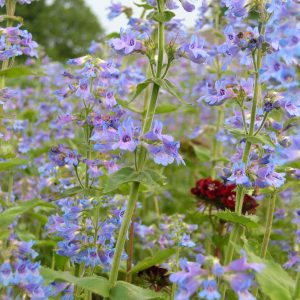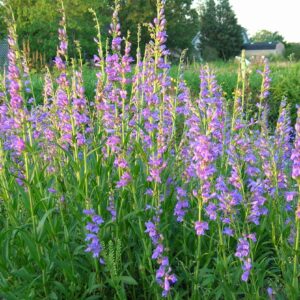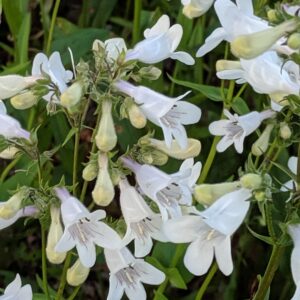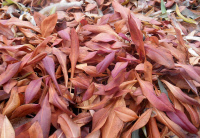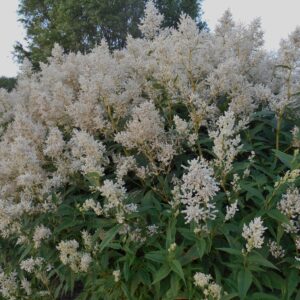Perennials & Biennials
Showing 329–336 of 485 results
-
Papaver rupifragum Spanish poppy Z 5-9
Small crinkled, crepe-paper like apricot petals all summer & fall except for a recess in the heat of July. If you let them go to seed they will make more plants and you’ll be glad for it.
Small crinkled, crepe-paper like apricot petals all summer & fall except for a recess in the heat of July. If you let them go to seed they will make more plants and you’ll be glad for it.
Size: 12-18" x 8"
Care: sun in well-drained to moist well-drained soil. Deer resistant, drought tolerant
Native: Spain, Asia Minor & CaucasusFirst described in Journal of Botany in 1873. Louise Beebe Wilder considered this among her favorite perennials. (1918). One of our favorites too! Gertrude Jekyll, mother of the mixed perennial border planted this for its “rich apricot color.” (1908).
-
Parthenium integrifolium Wild Quinine Z 3-8
Work-horse white cymes July through October
Work-horse white cymes July through October
Size: 2-3’ x 12”
Care: sun in moist well-drained soil
Native: Mass. To Georgia & Minn. To Arkansas, incl. WI
Wildlife Value: provides nectar and pollen to native bees.Seeds are fragrant when crushed. Named “quinine” because it was used to treat fevers similar to malaria. Catawabe Indians used the leaves to treat burns and the flowers to treat fever. 1st described in literature in 1732.
-
Penstemon ovatus Beardtongue Z 4-9
Cornflower blue trumpets encircle spike in June, one of our favorites.
OUT OF STOCK
Cornflower blue trumpets encircle spike in June, one of our favorites.
Size: 2’ x 8”
Care: Full sun in well-drained soil
Native: Pacific Northwest
Wildlife Value: attracts Baltimore butterfly, bees, bumblebees, flies, wasps and hummingbirds.Penstemon is named for its five stamens, penta meaning five in Greek. Penstemons. Ovatus means oval, shaped like an egg, with the narrower end up, referring to the foliage. This species first collected by Scottish plant hunter David Douglas (1799-1834) and introduced in 1826.
-
Penstemon strictus Rocky Mountain penstemon Z 3-8
Spikes of deep purplish-red bells in summer
Spikes of deep purplish-red bells in summer.
Size: 30" x 24"
Care: Full sun in well-drained soil. Drought tolerant
Native: Wyoming to Arizona
Wildlife Value: feeds bees, hummingbirds and butterfliesPenstemon is named for its five stamens, penta meaning five and stemon meaning stamen in Greek. Strictus means “erect.” This species collected by explorer, military officer and politician John C Fremont (1813-1890) and described in 1846.
-
Penstemon tubaeflorus Great Plains Beardtongue 4-8
Spikes of swan white trumpets with flared ends blooms in early summer. One of most reliable, long lived penstemons.
Spikes of swan white trumpets with flared ends blooms in early summer. One of most reliable, long lived penstemons.
Size: 2-3’x 15”
Care: Sun in well-drained to moist well-drained soil
Native: Central Plains N., S. to TX & NE to Maine, Wisconsin native
Wildlife Value: feeds Baltimore butterfly, other butterflies, bees and hummingbirdsPenstemon is named for its five stamens, penta meaning five and stemon meaning stamen in Greek. Collected by English botanist Thomas Nuttall (1786-1859) who searched entire No. American continent – parts of Canada, from New England west to Oregon, parts of the South, Midwest, the Plains, the S.E., California & Hawaii, finding hundreds of new plants.
-
Persicaria affinis syn. Bistorta affinis Dwarf fleeceflower, Himalayan Knotweed Z 4-9
A spreading, mat-forming perennial of pink to red flower spikes, blooming late summer and autumn. Its’ equally impressive foliage, deep green above & pale blue green beneath, turns red in autumn and winter. Excellent for groundcover, large rock gardens and the front of a border.
A spreading, mat-forming perennial of pink to red flower spikes, blooming late summer and autumn. Its’ equally impressive foliage, deep green above & pale blue green beneath, turns red in autumn and winter. Excellent for groundcover, large rock gardens and the front of a border.
Size: 8-12” x 3’ spreading
Care: sun to part shade in moist well-drained soil
Native: high mountains of Nepal in rocky areas and open slopesCollected by plant hunter Nathaniel Wallich (1786-1854) and described by botanist David Don (1799-1841) in Prodromus Florae Nepalensis in 1825.
-
Persicaria amplexicaulis var. speciosum syn. Bistorta amplexicaulis Mountain fleeceflower Z 4-7
queen of flowers with red spikes lasting from June to October
A naming mess. Even experts cannot agree on the name. Flora of China calls this Polygonum amplexicaule var. amplexicaule and lists 7 synonyms. The Missouri Botanic Garden says this is the same as Persicaria amplexicaule ‘Firetail.’ Regardless of the name it’s a queen of flowers with magenta spikes lasting from late June to October. One of internationally known garden designer Piet Oudolf’s “MUST HAVE” plants. Gardens Illustrated 94 (2013)
Size: 3’-4’ x 3’-4’
Care: sun to part shade in moist to moist well-drained soil
Native: Pakistan, Hubei, Sichuan, Xizang, Yunnan in China.
Wildlife Value: deer & rabbit resistant; feeds bees and butterflies
Awards: Silver Banksian Medal from England’s Royal Horticultural Society in 1922. The Royal Horticultural Society also granted an Award of Garden Merit and the Elisabeth Cary Miller Garden named it a Great Plant PickCollected for western gardens by 1825 when described by botanist David Don in Prodromus Florae Nepalensis. Nathaniel Kider exhibited this at the Massachusetts Horticultural Society in 1872.
-
Persicaria polymorpha syn. Persicaria alpina, Koenigia alpina Giant fleeceflower Z 4-9
Giant white plumes June-October tower on its 5-6’ stems
Giant white plumes June-October tower on its 5-6’ stems
Size: 5-6' x 5' (big but not invasive)
Care: sun to part shade in moist to moist well-drained soil
Native: China, Korean peninsula & Himalayas
Wildlife Value: Deer and rabbit resistant
Awards: Great Plant Pick Award from Elisabeth Carey Miller Botanical Garden. Rated “Excellent” by Chicago Botanic GardenOne of the hot “new” plants promoted by landscape designer Wolfgang Oehme. In fact, this plant was collected before 1872 (it flowered in London in 1872, per The Garden) and was described more than 100 years ago by premier Japanese botanist Takenoshin Nakai (1882-1952.) Nakai, professor, author, scholar and appointed official botanist for Korea in 1910 after Japan annexed Korea following the Sino-Japanese and Russo-Japanese wars. There he explored the botanically unknown mountains and forests introducing its plants to the world through his international contacts and authoring Flora Koreana. (1909-1910)

